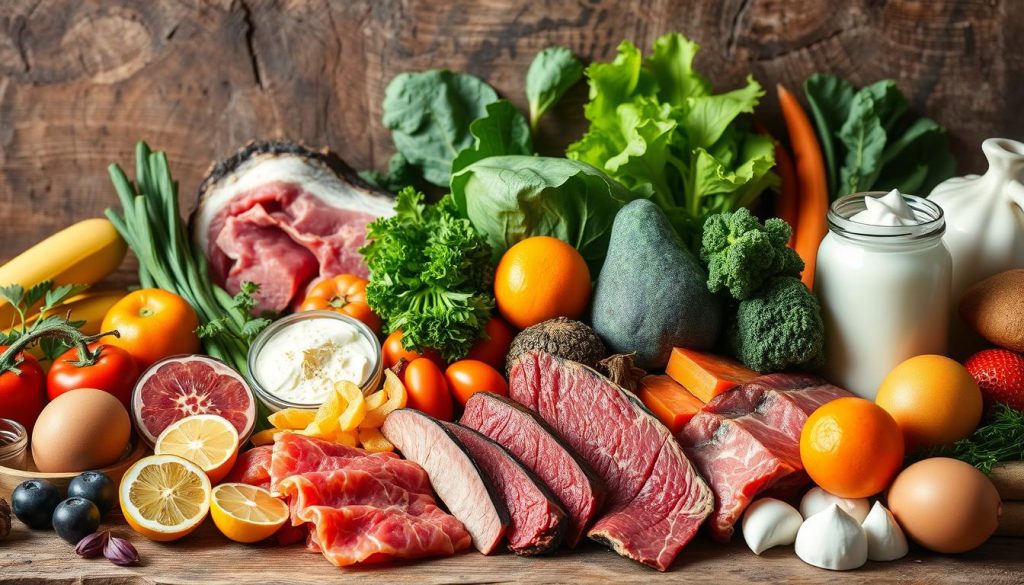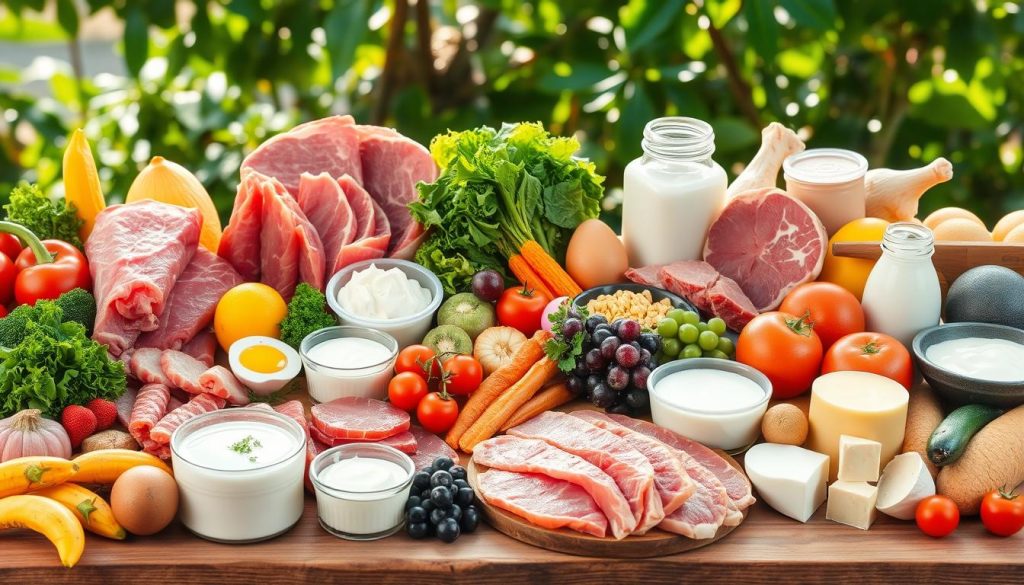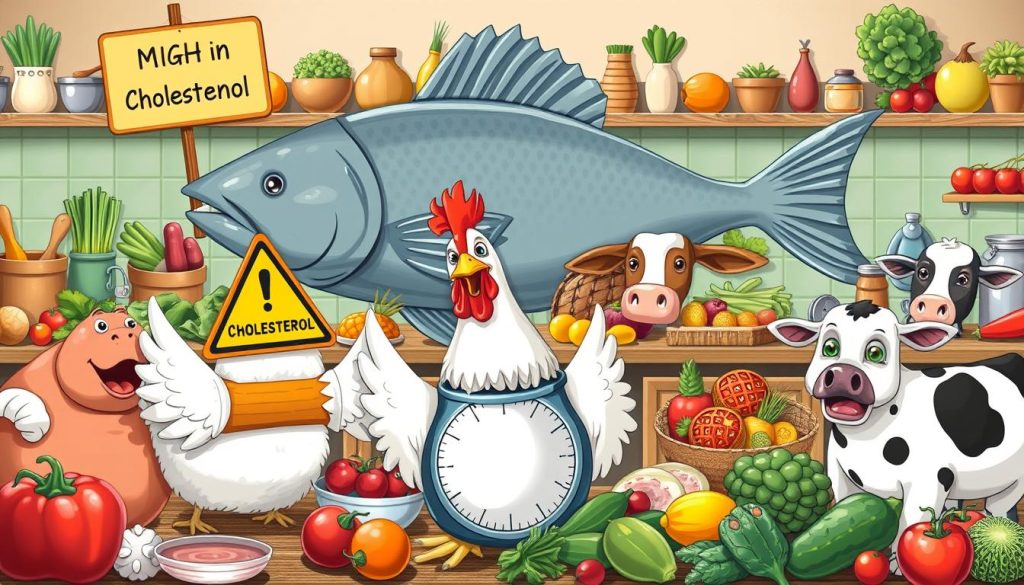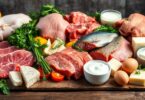Did you know that animal-based foods make up over 40% of the world’s total protein intake? This fact highlights the crucial role these foods play in our nutrition and health. This guide delves into the nutritional benefits of animal-based foods. It shows their importance in a balanced diet and their significant impact on our well-being.

Key Takeaways
- Animal-based foods are a rich source of high-quality, bioavailable proteins essential for growth, repair, and maintenance of the body.
- Animal products provide a complete profile of essential vitamins and minerals, including those that are difficult to obtain from plant-based sources.
- The fatty acids found in animal foods, particularly omega-3s, play a critical role in brain function, heart health, and inflammation regulation.
- Dairy products and eggs are nutrient-dense powerhouses that offer a unique combination of macronutrients, vitamins, and minerals.
- Incorporating a variety of high-quality animal-based foods into a balanced diet can have profound benefits for overall health and well-being.
Understanding Animal-Based Nutrition Fundamentals
Exploring the world of animal-derived products uncovers a wealth of essential nutrients crucial for human health. From a nutritional standpoint, these foods are notable for their high nutrient density. They provide a wide range of vitamins, minerals, and bioactive compounds. These elements are vital for supporting various bodily functions.
Essential Nutrients from Animal Sources
Animal-based foods are celebrated for their high-quality protein, containing all essential amino acids. These are necessary for tissue growth, maintenance, and repair. Additionally, these products are rich in micronutrients like vitamin B12, iron, zinc, and selenium. These nutrients are often lacking in plant-based diets.
The Role of Animal Products in Human Health
Including animal-derived products in a balanced diet significantly impacts overall well-being. These foods are packed with nutrients that support optimal brain function, a robust immune system, and healthy heart function. Studies have shown a positive link between animal-based food consumption and better metabolic markers, cognitive performance, and reduced disease risk.
Historical Significance in Human Evolution
The historical importance of animal-based foods in human evolution is immense. Hunting, gathering, and consuming these products were key to our cognitive and physical development. They provided the necessary nutrients for our ancestors’ growth and sustenance. This connection between animal-based diets and human thriving influences our understanding of optimal nutrition today.
As we explore animal-based nutrition further, it’s clear that these foods offer a comprehensive and balanced approach to nourishing the human body. This is true both in the present and throughout our evolutionary history.
The Complete Protein Profile of Animal Foods
Building and maintaining muscle requires high-quality protein. Animal-based proteins stand out due to their complete amino acid profiles. These essential amino acids, which our bodies cannot produce, are crucial for muscle growth.
Meat, poultry, eggs, and dairy are top animal protein sources with a full range of amino acids. They are essential for athletes and fitness enthusiasts aiming to enhance muscle building nutrition and recovery.
| Protein Source | Essential Amino Acids |
|---|---|
| Beef | Leucine, Isoleucine, Valine, Lysine, Methionine, Threonine, Tryptophan, Phenylalanine |
| Chicken | Leucine, Isoleucine, Valine, Lysine, Methionine, Threonine, Tryptophan, Phenylalanine |
| Eggs | Leucine, Isoleucine, Valine, Lysine, Methionine, Threonine, Tryptophan, Phenylalanine |
| Dairy (Milk, Cheese, Yogurt) | Leucine, Isoleucine, Valine, Lysine, Methionine, Threonine, Tryptophan, Phenylalanine |
The animal protein sources in these foods offer the full range of essential amino acids for muscle growth, repair, and recovery. They are crucial for any effective protein for athletes or muscle building nutrition plan.

“Animal-based proteins are highly bioavailable, meaning the body can easily absorb and utilize the essential amino acids they contain.”
Incorporating various animal protein sources into your diet ensures your body gets the complete nutrients it needs to thrive and perform optimally.
Essential Fatty Acids and Animal Sources
Animal-based foods are known for their high levels of essential fatty acids, especially omega-3s. These fats are vital for our bodily functions and overall health. They aid in nutrient absorption and support heart health, making them crucial for a balanced diet.
Omega-3 Rich Animal Foods
Cold-water fish like salmon, mackerel, sardines, and anchovies are top sources of omega-3s. They are rich in EPA and DHA, two key omega-3s. Grass-fed meats and omega-3-fed eggs also offer these essential fatty acids.
Understanding Animal Fats
The debate on animal fats in our diet is ongoing. Not all animal fats are the same. Saturated fats in dairy and some meats may raise heart disease risk. Yet, monounsaturated and polyunsaturated fats in animal foods are better for heart health.
Bioavailability of Fatty Acids
The body’s ability to absorb fatty acids is key. Animal foods like eggs and fatty fish have better omega-3 absorption than plant-based options. This means our bodies can use these fats more efficiently, boosting health.

“Incorporating omega-3-rich animal foods into a balanced diet can be a simple yet powerful way to support overall health and well-being.”
Animal-Based Source: Benefits and Considerations
The debate between animal-based and plant-based proteins is central to health and nutrition discussions. Animal-based foods, such as meat, dairy, and eggs, offer unique health benefits. These are essential for a balanced diet and overall nutrition for health.
Animal-based protein boasts a high biological value. This characteristic means it contains all essential amino acids our bodies need. In contrast, many plant-based proteins are incomplete, lacking one or more of these amino acids.
Animal-based foods are also rich in essential nutrients like vitamin B12, iron, zinc, and selenium. These nutrients are crucial for various bodily functions, from red blood cell formation to immune system support. Plant-based diets often lack these micronutrients, making animal-based sources vital for a healthy, balanced diet.
| Nutrient | Animal-Based Sources | Plant-Based Sources |
|---|---|---|
| Vitamin B12 | Meat, dairy, eggs | Limited, primarily fortified foods |
| Iron | Red meat, organ meats | Leafy greens, legumes, fortified cereals |
| Zinc | Meat, seafood, dairy | Nuts, seeds, whole grains |
| Selenium | Seafood, organ meats, dairy | Nuts, seeds, whole grains |
The health benefits of meat and other animal-based foods are well-documented. However, it’s crucial to consider potential concerns. Consuming too much of certain animal products, like processed or high-fat meats, can increase the risk of chronic diseases. Moderation and portion control are essential when adding animal-based foods to a balanced diet.
A balanced diet that includes both animal-based and plant-based sources of protein and nutrients is best for optimal health and nutrition. Understanding the health benefits of meat and other animal-based foods, as well as the potential considerations, helps individuals make informed choices for their well-being.

Micronutrients Exclusive to Animal Products
Plant-based diets offer a wide range of essential nutrients. However, some micronutrients are found mainly or only in animal-based foods. These include vitamin B12, heme iron, zinc, and selenium. Each plays a key role in maintaining human health.
Vitamin B12 and Iron Sources
Vitamin B12 is crucial for red blood cell formation and nervous system function. It’s not found in plant-based foods. Therefore, animal-based vitamin B12 sources like meat, dairy, and eggs are vital for vegetarians and vegans. Iron-rich foods such as red meat, liver, and seafood are also essential. They provide heme iron, which is more easily absorbed than plant-based iron.
Zinc and Selenium Content
Zinc is another key micronutrient found mainly in animal products. It’s vital for immune function, protein synthesis, and wound healing. Animal sources of zinc include red meat, poultry, and seafood. Selenium, a powerful antioxidant, is primarily found in animal-based micronutrient sources like fish, organ meats, and dairy products.
Fat-Soluble Vitamins in Animal Foods
Animal-based foods are rich in fat-soluble vitamins A, D, E, and K. These vitamins are essential for vision, bone health, immune function, and blood clotting. They are more easily absorbed and utilized by the body when consumed in animal-based diets.

Including a variety of high-quality animal products in your diet is crucial. It ensures you get enough of these vital micronutrients. These nutrients are often hard to get from plant-based sources alone.
Dairy Products: Nutritional Powerhouse
Dairy products are a true nutritional powerhouse. They come from dairy farming and include milk, cheese, and yogurt. These items are packed with essential nutrients, making them key to a balanced diet.
Calcium is a standout mineral in dairy, crucial for bone health. Milk and cheese are top calcium sources. They offer high-quality dairy benefits protein too. This protein supports muscle growth and repair. Dairy also contains other vital nutrients for overall health.
| Nutrient | Dairy Products | Percentage of Daily Value |
|---|---|---|
| Calcium | Milk, Cheese, Yogurt | Up to 30% |
| Protein | Milk, Cheese, Yogurt | Up to 20% |
| Vitamin B12 | Milk, Cheese | Up to 50% |
| Riboflavin | Milk, Yogurt | Up to 40% |
For those with lactose intolerance or dairy allergies, there are alternatives. Lactose-free dairy and plant-based milk and cheese substitutes are options. They help keep diets balanced and rich in nutrient-rich foods.

Dairy’s nutritional profile and historical importance make it a nutritional powerhouse. It’s vital for a healthy diet, whether in traditional or alternative forms.
Eggs: Nature’s Perfect Protein Package
Eggs are celebrated for their nutritional value, offering high-quality protein, vitamins, and minerals. They are a versatile ingredient, essential in kitchens globally. Eggs can be used in a variety of dishes, from breakfast staples to sweet baked goods.
Nutrient Composition of Eggs
A single large egg is packed with essential nutrients. It’s a top source of eggs nutrition, providing a complete protein profile. Eggs also contain vitamins B12, D, and A, along with minerals like iron, zinc, and selenium. This makes them a nutritional powerhouse.
Different Types of Eggs and Their Benefits
- Pasture-raised eggs: These eggs come from chickens that roam freely and forage on open pastures. They are richer in omega-3 fatty acids, vitamins, and antioxidants than conventionally raised eggs.
- Organic eggs: Organic eggs are from hens fed without synthetic pesticides, hormones, or antibiotics. They are often seen as a healthier option for poultry production.
- Free-range eggs: Hens that lay free-range eggs have outdoor access. This allows them to engage in natural behaviors, potentially producing eggs with better nutrition.
Eggs, regardless of type, are a great food source of protein. They can be easily added to a balanced diet. Enjoy them for breakfast, in baking, or in various dishes. Eggs provide a convenient and nutritious way to support health and well-being.

“Eggs are one of nature’s most perfect foods, providing a complete package of essential nutrients and high-quality protein.” – Registered Dietitian, Jane Doe
| Nutrient | Amount per Large Egg |
|---|---|
| Calories | 72 |
| Protein | 6 grams |
| Fat | 5 grams |
| Cholesterol | 186 mg |
| Vitamin A | 270 IU |
| Vitamin B12 | 0.6 mcg |
| Selenium | 15.4 mcg |
Seafood and Marine-Based Nutrition
Seafood is a treasure trove of essential nutrients that can significantly boost your health. From the depths of the ocean come a bounty of nutrient-rich foods that are rich in omega-3 fatty acids. These acids are crucial for heart and brain function.
The health benefits of seafood are well-documented. Studies have shown that regular consumption of fish and other marine-based proteins can help lower the risk of heart disease. It also improves cognitive function and supports a healthy immune system. This is largely due to the high concentration of omega-3 fatty acids found in many seafood varieties.
Sustainable fisheries play a vital role in providing these nutrient-dense foods. By sourcing seafood from responsibly managed fisheries, you can enjoy the seafood health benefits. This supports environmentally-conscious practices that protect our oceans and marine ecosystems.
Omega-3 Powerhouses
Fatty fish, such as salmon, mackerel, and sardines, are particularly rich in the essential omega-3 fatty acids EPA and DHA. These healthy fats have been shown to promote heart health, reduce inflammation, and support brain function. Incorporating these omega-3 rich seafood options into your diet can be a game-changer for your overall well-being.
| Seafood | Omega-3 Content (mg per serving) |
|---|---|
| Salmon (3 oz.) | 1,800 |
| Mackerel (3 oz.) | 1,700 |
| Sardines (3 oz.) | 1,400 |
| Tuna (3 oz.) | 500 |
The table above highlights the impressive omega-3 fatty acid content of various seafood options. It underscores the exceptional nutritional value of these marine-based foods.

“Seafood is an essential part of a healthy, balanced diet. The nutrients found in fish and other marine-based proteins can have a profound impact on our overall well-being.”
Quality Matters: Choosing the Best Animal Products
The quality of animal-based nutrition products significantly impacts your health. It’s crucial to distinguish between grass-fed and grain-fed animals. Also, knowing the labels and certifications for sustainable and ethical farming practices is essential.
Grass-Fed vs. Grain-Fed: The Benefits of Grass-Fed
Grass-fed animal products have numerous advantages over grain-fed ones. They are richer in omega-3 fatty acids, conjugated linoleic acid (CLA), and antioxidants like vitamin E. These products come from animals raised in a more sustainable and natural environment. They have access to pasture and follow their evolutionary diet.
Understanding Labels and Certifications
When selecting animal-based foods, look for third-party certifications. These indicate the products come from farms prioritizing animal welfare, environmental stewardship, and food safety. Some notable labels include:
- USDA Organic: Confirms the animals were fed without synthetic pesticides and fertilizers. They were not given antibiotics or growth hormones.
- Certified Humane: Shows the animals were raised with minimal stress and meet Certified Humane standards.
- Animal Welfare Approved: Verifies the animals were raised on pasture-based farms with the highest animal welfare standards.
By understanding these labels and opting for sustainably-produced animal products, you ensure nutritious and ethically-sourced food for your family.

Optimal Storage and Preparation Methods
Keeping animal-based foods safe and nutritious is key for a healthy diet. Understanding how to store and cook these foods is crucial. It ensures their benefits and reduces risks.
Storing Animal Products Properly
Proper storage is essential for the quality and longevity of animal-based foods. Refrigeration is vital for meats, poultry, and dairy. Eggs, fish, and seafood need extra care to stay fresh. Airtight containers, vacuum sealing, and controlled temperatures are vital for nutrient preservation and food safety.
Cooking for Nutrient Retention
The method of cooking animal products greatly affects their nutritional value. Gentle cooking methods like poaching, steaming, or slow-roasting preserve vitamins and minerals. High-heat methods like grilling or frying can lead to nutrient loss. Planning meals and optimizing cooking times ensures you maximize the benefits of animal-based ingredients.
Food Safety Considerations
Ensuring the safety of animal-based foods is critical. Proper handling, thorough cooking, and following food safety guidelines are essential. Knowing internal temperatures, preventing cross-contamination, and safe thawing methods are key to avoiding foodborne illnesses.
| Storage Tips | Cooking Methods | Food Safety Practices |
|---|---|---|
| Refrigerate at the correct temperature Use airtight containers or vacuum sealing Freeze items for extended shelf life Monitor expiration dates | Poach, steam, or slow-roast for nutrient retention Avoid high-heat cooking like grilling or frying Adjust cooking times to prevent overcooking | Follow recommended internal temperatures Prevent cross-contamination Thaw foods safely in the refrigerator Discard expired or questionable items |
By adopting these storage, preparation, and food safety practices, you can enjoy the nutritional benefits of animal-based foods. This approach prioritizes your health and well-being.

Incorporating Animal Products in a Balanced Diet
Creating a balanced diet with animal-based foods demands careful planning and moderation. It’s essential to focus on variety, portion control, and strategic meal preparation. This ensures you get the right nutrients while keeping your lifestyle healthy.
Portion Control Guidelines
Portion size is critical when it comes to animal products. Experts suggest the following guidelines:
- Meat, poultry, and fish: 3-4 ounces per serving
- Eggs: 1-2 eggs per serving
- Dairy: 1 cup of milk or yogurt, 1.5 ounces of cheese per serving
It’s vital to stick to these portion sizes and avoid overeating. Excessive consumption can cause weight gain and health issues.
Meal Planning Strategies
To include animal-based foods in your diet, you need to plan your meals carefully. Here are some strategies to consider:
- Vary your protein sources: Mix up your animal-based proteins, such as lean meats, poultry, seafood, and dairy, to ensure a diverse nutrient intake.
- Pair with plant-based foods: Combine animal-based proteins with a variety of fruits, vegetables, whole grains, and legumes to create a well-rounded, balanced diet.
- Plan ahead: Meal prepping and planning can help you maintain portion control and ensure a healthy eating habits throughout the week.
By adhering to these guidelines and using strategic meal planning, you can enjoy the benefits of animal-based foods. This approach supports a lifestyle nutrition and aids in nutrition for weight loss.

Sustainable and Ethical Animal Product Consumption
As conscious consumers, we wield significant influence through our food selections. Animal-based products demand our attention to sustainability and ethics. Sustainable farming and humane livestock rearing are essential for a balanced, eco-friendly food system.
Sustainable animal farming adopts a holistic strategy. It focuses on animal welfare, reduces environmental harm, and boosts resource efficiency. This includes rotational grazing, regenerative agriculture, and cutting down on waste and emissions. Supporting farmers who emphasize animal husbandry sustainability is key to a sustainable food future.
- Choosing sustainable animal farming products lessens our food’s carbon footprint.
- Opting for livestock rearing that values animal welfare ensures a more ethical food system.
- Exploring food preferences that balance plant and animal sources leads to a sustainable, nutritious diet.
Being mindful of animal-based foods is crucial. Understanding our choices’ impact and backing producers who value sustainability and ethics is vital. This way, we contribute to a food system that’s resilient and fair for future generations.
“The future of food hinges on our collective ability to make sustainable, ethical choices. By supporting responsible animal farming practices, we nourish ourselves while safeguarding the planet.”

Common Myths About Animal-Based Foods
In the world of nutrition and health, many myths and misconceptions surround animal-based foods. It’s vital to distinguish fact from fiction and rely on scientific evidence for informed dietary choices. Let’s delve into some common myths and debunk them with research.
Scientific Evidence and Research
Contrary to popular belief, animal-based foods offer numerous health benefits. Research indicates that animal proteins are highly bioavailable, easily absorbed and utilized by the body. They also provide a complete profile of essential amino acids, crucial for muscle and tissue building.
Furthermore, animal-based foods are rich in critical micronutrients like vitamin B12, iron, zinc, and selenium. These nutrients are often scarce in plant-based diets. They play a vital role in maintaining optimal health and wellness.
Debunking Popular Misconceptions
- Myth: Animal-based foods are inherently unhealthy and should be avoided.
- Myth: All animal fats are harmful and should be eliminated from the diet.
- Myth: Dairy products are only for children and should be avoided by adults.
By understanding the scientific evidence and debunking these myths, we can make informed choices. We can incorporate animal-based foods into a healthy, balanced diet that supports overall health and wellness.

Conclusion
In this comprehensive guide, we’ve explored the vital role of animal-based nutrition in a balanced, healthy lifestyle. We’ve covered the fundamental nutrients in animal sources and their historical importance in human evolution. This journey has revealed the diverse benefits these foods bring.
Animal products offer a complete protein profile, essential fatty acids, and unique micronutrients. We’ve shown how these foods contribute significantly to our well-being. We’ve discussed dairy, eggs, seafood, and high-quality meat, offering insights for informed dietary choices.
As you strive for optimal health and wellness, remember the significance of animal-based nutrition, essential nutrients, and a balanced diet. By embracing the natural bounty these foods offer, you can nourish your body and support its functions. This unlocks the path to vibrant health and wellness. Let animal-based sources be the cornerstone of your culinary and nutritional explorations.
FAQ
What are the essential nutrients found in animal-based foods?
Animal-based foods are packed with essential nutrients. They offer high-quality protein, healthy fats like omega-3s, and vitamins A, D, and B12. They also contain minerals such as iron, zinc, and calcium.
How do animal-derived proteins compare to plant-based proteins?
Animal proteins are complete, meaning they have all essential amino acids for health. Plant-based proteins often lack one or more amino acids. Animal proteins are also more easily absorbed by the body.
What are the health benefits of incorporating animal-based foods into a balanced diet?
Animal-based foods support muscle growth and brain function. They also help maintain bone health and boost the immune system. They enhance nutrient absorption and provide essential nutrients.
Are there any considerations or concerns with consuming animal-based foods?
Animal-based foods are healthy when part of a balanced diet. However, consider portion sizes and choose high-quality sources. Address dietary restrictions and allergies. Consult a healthcare professional for personalized advice.
What are some of the micronutrients that are exclusive to animal-based sources?
Vitamin B12 and heme iron are mainly found in animal foods. These nutrients are vital for bodily functions. Those on plant-based diets may need supplements or careful meal planning.
How do different types of animal products, such as dairy and eggs, contribute to overall nutrition?
Dairy is rich in protein, calcium, and essential nutrients. Eggs are a complete protein source, offering amino acids, vitamins, minerals, and healthy fats.
What are the benefits of choosing high-quality, sustainably-produced animal products?
High-quality animal products offer more nutrients like omega-3s. They support ethical and environmentally-friendly farming practices.
How can I incorporate animal-based foods into a balanced, healthy diet?
Include animal-based foods in moderation and vary your diet. Aim for a mix of animal and plant-based foods for a balanced nutrient intake.
Are there any common myths or misconceptions about animal-based foods that need to be addressed?
Yes, myths like all animal fats being unhealthy or animal foods harming the environment are common. These claims lack scientific backing. It’s crucial to research and understand the facts about animal-based nutrition.






